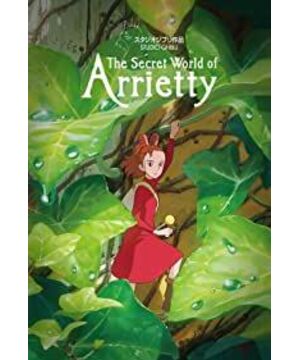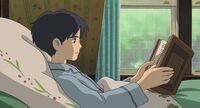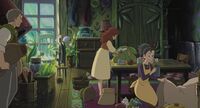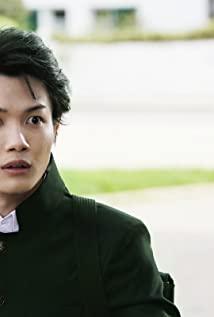I still have a few words from that time. Outside of memory, they may prove that those feelings that have been difficult to distinguish between true and false in the years, prove that we once existed. "Forgetting means betrayal", but if we don't deliberately record what happened, and don't try to preserve the memory, wouldn't it be cruel and irresponsible. We will remember that, then, that beautiful period is like a bridge, connecting us forever, and therefore we are overlapping and together. So, when parting, Xiang said to Arrietty: "You are already part of my heart."
In the fairy tale of the little princess, Cinderella and the prince did not leave each other because of the changes in their small lives in the future, because they had lost themselves. Maybe only death is eternal, so at that time I said, "When love no longer despise life \ we are complicit with time \ kill the past again and again \ why not use death to prove that we are young \ waiting for bravery to become naive". At that time, I had not lost my fierceness and determination, and I had not passed through the fog of love.
In the eyes of that time, I may have died or been abandoned at this time. In the eyes of this time, it is a new life, because I killed the past. In short, the past is no longer there, or remains in an unrecognizable way. I suddenly thought, if a flower could see its own beauty, would it also want to be picked and die prematurely? At the moment when its beauty was understood, would it also silently say in my heart: I would like to be only for the sake of You bloom, even if only for a brief moment. We yearn for the splendor of flowers, but we also have to face its withering, just like we fall in love with a person, but do not want to face the disappearance of love. The flower is the whole of the flower, but the body is not the whole of the person. Life will inevitably decline, but the human heart can experience the opposite change. So I said, if you can't love someone in reality, sublimate this love. (Maybe it doesn't matter in the end, just as it may never matter to you.)
Watching this movie, I think of Pu Shu's lyric: "This is a journey\a boundless journey called destiny\We meet by chance and then leave\On this road that will never return". The film should be a good interpretation of this lyric. The little boy Xiang, who is seriously ill and whose future is uncertain, and Arrietty, who are carrying the hope for the survival of the little human race, are the existence of two worlds. Even if they meet by chance, they still have the color of fairy tales. It's an incongruous antagonism. In terms of time, one seems to be coming to an end, and the other has just been revealed; in terms of life, one is dull and the other is full of vigor; in terms of biology, they are hardly a species, and naturally cannot coordinate on the important basic level of love; in society Sexually, two people live in two completely different living spaces and ways. One is a child recuperating under the protection of his mother, while the other has to shoulder the responsibility of family and even racial survival early on. In terms of age, it is also in the period of puberty that only blooms and does not bear fruit. After thinking about it too much, in fact, it is difficult to define whether the relationship between two people is love or not. Love has different definitions in different eras and social backgrounds, not to mention that they are still at an ignorant age where friendship and love are still unclear. A way is an end and is therefore pure. As I write this, I suddenly feel that I have fallen into a huge misunderstanding. Putting the original simple and beautiful story between two children into a love framework with the purpose of living together is wrong in itself.
Looking at the ending of the story from this angle, it should come as no surprise. However, the film still makes people feel a concept related to the spirit of the times, or reflects the popular concept of love in this era. What it gives is another kind of complete "end", not the kind of bloody consummation represented by the old classics and the tendency to advocate rebellion and freedom since the Enlightenment, thereby sanctifying love and turning it into a tool. . That is to say, abandoning the combination as the ultimate goal, and tending to spiritual identification, inner echo and memory preservation, because the world of the heart cannot be cut off without time and space distance, so there is no ending, and parting does not mean the end. If you don't want anything from the person you love, it doesn't matter if you lose, just watch her silently, be faithful to your heart and do everything you want, that's enough. But how can real love be so ideal? How can you love someone without close yearning, without any desire, and without any resentment? Come back again, talk about times and love. Nietzsche said that "God is dead", and perhaps it can be said that "love is dead" today. God does not exist in the first place, but is composed of the conceptual world created by man. Similarly, the love we define is also a kind of conception. The composition of the structure, and is constantly changing. For example, ONS is generally not considered to be love now. No matter how strong the feeling is, sexual relations can be unrelated to love, and online dating is excluded in the eyes of some people. Even though there is a rigorous psychological definition of love, there is also a universal understanding in the mainstream ideology, and this is more important. The relationship of love itself is complex, including the fit of all aspects of the body, society, mind, etc., and is rarely balanced. According to the method of psychology, the three attributes of intimacy, passion and commitment can be divided into many types and styles. However, in the eyes of different people, many styles may not be regarded as love. There are both idealized factors and more realistic calculations. For example, some people value money status, some people value spiritual communication, and some people value physical passion. It depends on your values. I don't want to assume extreme cases here, just talk about tendencies. Moreover, in a society where values are pluralistic and more tolerant, in a society where individual abilities can be freely exerted and must be reflected in economic value, in an era that does not shy away from talking about sexual capital and the liberation of human nature, there is really nothing to blame. If a person says that she loves you, that her love for you will never change, but when you need her to make substantial contributions, she will lightly say to you, I think what I love for you is not love, but a kind of sympathy. You finally understand that the reason why she said she loves you is because you can give her a sense of satisfaction, Enables her to imagine herself as someone who is willing to give without actually having to. Just because she's in love with a love story about you and you're just a prop for her. So you give up, but she will never understand, it's just a test. . . (Forgive me for writing and venting like this, because I don’t think that person will see, it’s like they have never heard from each other since, everything is in the past)
That's what love is, you believe it exists, it exists, you don't, it doesn't exist, you think it's love, it's, you don't, it doesn't.
Maybe I made another mistake, I forgot the time. You can't blame milk for being poisonous to you beyond its shelf life, but maybe, it's already poisonous. I don't regret it, I don't rejoice, I wish I did. Maybe I shouldn't use this analogy because I can't count on milk that never expires unless the person drinking it expires early, or dies.
Sorry for interspersing personal grievances. Speaking of it, the love in front of you died. Maybe what I'm talking about is the stereotyped love that is now called a fairy tale, where the protagonists end up living together sweetly and forever after a little struggle to the death or trying to overcome all odds. The so-called dead here actually means that no one believes, and no one believes in God, and he has no reason. Those love stories and fairy tales are undoubtedly like a kind of education or abetting, and like a commodity on the shelf, which makes people want to consume and generate meaning by imitating the patterns and bridges in it to obtain emotional experience. Art is also a kind of This kind of spiritual product, its value will inevitably affect the value of the audience, no need to repeat it, otherwise you should be annoying. I haven't read the book and read the introduction. "Lady Chatterley's Lover" is such an example. Simply put, if you read too many novels, you will be derailed. From a contemporary point of view, it is like those who have been ridiculed again and again by the pseudo-wenqing, the petty bourgeoisie and the fresh, and those children who are deeply influenced by Qiongyao Yishu and Annie's babies, who are a little unnatural. But these often represent the zeitgeist. Since the enlightenment, the development of nature and human sciences has been changing with each passing day. Love, like a drug, has lost the mystery and hypnotic effect of the ignorant era. It has been precisely defined as the chemical reaction of the brain. Love, hate and pain, why love at first sight is like a dream, there is an accurate explanation of psychology and emotional counseling, that is to say, it has been deconstructed (the word is used very carefully), not to mention that it is always there direct and indirect experience that occurs. What you see clearly you will not be swayed by what, so is love.
Thinking of a popular saying "whose new love is not someone else's old love", there is a calm and optimistic expression in the words. This kind of negative self-comfort, which is almost exchanging freedom for equality, reflects the value of traditional love. The helplessness of loss, everyone no longer cares about whether it is the same or not, and no longer cares about the other person who has loved and will fall in love with others in the future. Just like a friend once said to me in a letter: "Sometimes I am willing to gamble even when I understand the result, but it is all out of love. Some people say that love in youth is blind, and it is irresistible without considering the reality of the future. Together, the world has become less time for us to think too much about what it should be like to be with someone for a lifetime." I know that this is an era of precision and calculation that is very utilitarian, where everything can be quantified and exchanged for value. But the love that has lost the promise, the love that has not been promised from the beginning, how can people believe it, go for it, and stick to it. Maybe I'm wrong again, because people change, and even you will feel unfamiliar, because this is a turbulent era, just like our perturbed hearts. So, you will eventually lose the reason to hold on. You still need love, just no longer from the same person. I also think that this has nothing to do with conscience. After all, it is all about being loyal to one's own feelings. Sometimes people's will is really so powerless in the face of reality gaps, but some people adapt and some people don't. The nurturing child's paper should be able to feel this contradiction more ^
Let's go a little further, let's talk about movies. Then I thought of the luxurious and exquisite house that Xiang's family made especially for the villains, why they never lived in it. Or should I ask, why did they live in it. But it was really carefully built for the little people. Of course, obviously, first of all, this is because of security considerations, because after all, humans cannot be trusted, because the power of the two sides is not equal. But in fact, the more important thing is that the little people should strive to maintain a kind of independence, not rely on some uncontrollable force to exist, so that they become vassals or pets, although they live by "stealing", but those food and resources are What I have worked hard to obtain, and because it is limited, it does not affect human life, and it is not even noticed. What is consistent in the film is the saw to the lost piece of sugar. The sugar cube is lost, and then sent to the door by Xiang, but Arrietty does not accept it. This is not just because of morality, but also because of morality. Because Arrietty already has feelings for Xiang, she is so sensitive to equality in love. Acceptance undoubtedly means devaluation of her personality. "Eating people's mouths is soft, and people's hands are short." In the past, my mother always said: "There is a long-term relationship." She wanted to do everything possible to return the cube of sugar. In addition to subconsciously wanting to see Xiang again, it was also because she didn't want to teach others. Take the handle and fall into passive. When she finally parted, she finally accepted the candy cube, but she also left her hairpin to Xiang, which is not only an expression of affection, but also that the two sides do not owe each other. Noble love can only occur between two independent subjects, so equality is very important.
When the burden of love is removed one by one, it is purer or lacks thickness. If it's more of a feeling rather than practice and integration, are you really sure you've ever loved. But good feelings always have to be unsuccessful. When it is raised to the height of aesthetics, should it be gratified, or should it be sad. I suddenly thought, if I had to choose, I would like to be a Xiang or a little native. What do they represent? Is this a silly question, because there is no if, because you can't choose who you are. I thought again, why do I ask this, am I not satisfied with my situation? Maybe I wish I was no one, and then you don't choose anyone.
Forgive my selfishness, forgive me for speaking out my selfishness. But you know, it always has an expiration date.
And you still haven't seen anything.
The following text was written earlier. I just hope that, between sensibility and rationality, don't give up.
-------------------------------------------------- -------------------------------------------------- - Regarding the so-called "borrowing things" in the film, it can be understood from the perspective of different social consciousness behaviors. Stealing is determined by the nature of the act, but the identification of nature varies greatly in different legal and moral contexts. At the legal level, it is precise and strict, and it is either right or wrong. Judging from the film, it is obvious that there is no need to quote any legal provisions, and the fact of the theft is self-evident, no matter what the name is. What I want to say is that this way of thinking, which emphasizes clear facts, solid evidence, and clear distinction between right and wrong, is actually a relatively modern concept, which is closely related to the development of capitalism, the establishment of property rights, and the worship of instrumental rationality. Naturally this attitude also influences and determines our moral values, or at least it represents a general trend. However, this kind of nature has great flexibility at the conventional moral level, especially in the more traditional and ancient social forms. For example, Lu Xun once wrote in his memories of his hometown that people passing by are thirsty, Picking a watermelon to quench your thirst is not stealing. Going back to the film, the maid of Grandma Xiang's house obviously represents the former. She clearly defines the little people as thieves in nature, regardless of whether their actions cause harm to themselves, so she did not hesitate to invite rodents. The company came to eliminate the harm. Obviously, the little people were just "thieves" with the same status as the mice in her eyes. And Arrietty’s parents represent the tradition of the little people. Stealing exists only as a way of life and a custom passed down from generation to generation, and the custom itself can generate legitimacy through inheritance. From this, you can understand that those who once existed There are extremely inhuman customs in history and still exist among primitive and backward ethnic groups, such as circumcision, foot binding, burial, etc., too many to list. Of course, I do not agree with the attitude of cultural relativism, nor do I believe that any cultural form should be respected unconditionally, and its high and low standards should be denied. I just use this to illustrate that "borrowing things" can exclude the rationality of moral judgment in the culture of the little people. . That is to say, "borrowing things" is only considered to be stealing under the social norms of human beings, and it can be explained by another logic of its own in the world of the little people, or it does not need to be explained. For example, we have defined rats as pests, and identified the behavior of rats as stealing, but as a rat, there is no concept of stealing at all, it is just looking for food, whether it is from nature or humans. The kitchen and the farm are the same to it. However, starting from the interests of self-centeredness, human beings want to kill all the species that are judged to be "harmful", and attach moral judgments, which is an unnatural behavior in itself. Of course, it can also be understood as competition between species, but the difference is that this kind of damage is sometimes irrelevant to facts, that is, whether it does cause harm or not, it has been presumed to be harmful, just like a An original sin. From the movie, the servants of the Xiang family are the representative of this attitude. This also reflects a tendency to be instrumental, which is not difficult to understand from the attitude of servants towards villains, such as sealing them in glass bottles and asking a professional rodent control company to eliminate them (they are also described as rats on the phone). ), while completely ignoring the existence of the villain as the subject of life.
On the other hand, since the little human race exists as a kind of "human", there must be some things that are in common with human beings, or have universality, such as the basic standard of good and evil. This is probably why it is used to cover up with "borrowing things" instead of "stealing" directly. This reflects that the villain is morally conscious, and there is still a sense of guilt or shame in the subconscious. This is morality. the origin of origin. This just proves that the villain exists as a human being. Only on this basis can all discussions be meaningful and the definition of love between humans and the villain can be guaranteed.
A question about Ling in the film: Why did the villain move after being discovered? This may reflect an idealistic notion that a thing does not exist unless it is known. There is a basic principle in communication science that information can only have meaning in the receiver, and this is also the truth. That is to say, the villain did not exist for humans until it was discovered. Since it is not detected, it does not constitute influence and violation, and naturally there is no stealing. It's like saying, you have something hidden in the corner of your room, but you completely forget it, or you keep thinking it's there, and then you die without thinking about it, or trying to find it, So whether or not this thing is still there has anything to do with you. The same is true for people with good intentions or bad intentions to hide some information, that is, to artificially control the existence or not of a thing. In a nutshell, if the violation is not felt, then it does not exist. Maybe the little people may hold this concept and logic.
The appearance of the little natives in the film reflects the diversification of the life forms of the little people, and shows that the living life of the Arrietty family is only a choice. Is this parasitic (stealing) an insinuation that the way of life of civilization itself is a kind of plunder? , From Arrietty's mother, I can also feel a pursuit of exquisite luxury and dissatisfaction - she is simply the embodiment of petty bourgeoisie. Naturally, this relatively privileged life also limits its living space, which requires taking risks and paying a price. In the end, after being found, I was embarrassed and moved, and I had to give up almost everything that was originally there, and how did the "earthquake" feel like a metaphor. Is human beings to villains a bit like nature is to human beings? Maybe I'm thinking too much ^
View more about The Secret World of Arrietty reviews











